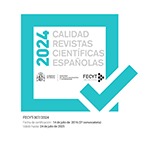Metodologías y modelos para auditar la información. Análisis reflexivo
Resumen
Se hace un recorrido por los referentes teóricos y metodológicos de la auditoría de información a partir de los cuales se realiza un análisis de varios aspectos comunes que incluyen tomando como muestra 13 metodologías y modelos reportadas en la literatura mundial. Se establecen comparaciones con una óptica reflexiva sobre el abordaje de este tipo de auditoría como una importante herramienta para diagnosticar el estado de los sistemas de información y las políticas de información en las organizaciones contemporáneas. Se determinan como las propuestas más significativas el modelo de Villardefrancos-Álvarez, y el de Orna; y las metodologías de Soy i Aumatell, Buchanan & Gibb, Henczel y González- Guitián. Se observa una tendencia a realizar auditorías de información con enfoque híbrido. Finalmente, se incluyen algunas consideraciones donde puede apreciarse la importancia del tema tratado y las posiciones de las autoras.Descargas
Descarga artículo
Licencia
La Revista General de Información y Documentación, para fomentar el intercambio global del conocimiento, facilita el acceso sin restricciones a sus contenidos desde el momento de su publicación en la presente edición electrónica, y por eso es una revista de acceso abierto. Los originales publicados en esta revista son propiedad de la Universidad Complutense de Madrid y es obligatorio citar su procedencia en cualquier reproducción total o parcial. Todos los contenidos se distribuyen bajo una licencia de uso y distribución Creative Commons Reconocimiento 4.0 (CC BY 4.0). Esta circunstancia ha de hacerse constar expresamente de esta forma cuando sea necesario. Puede consultar la versión informativa y el texto legal de la licencia.











